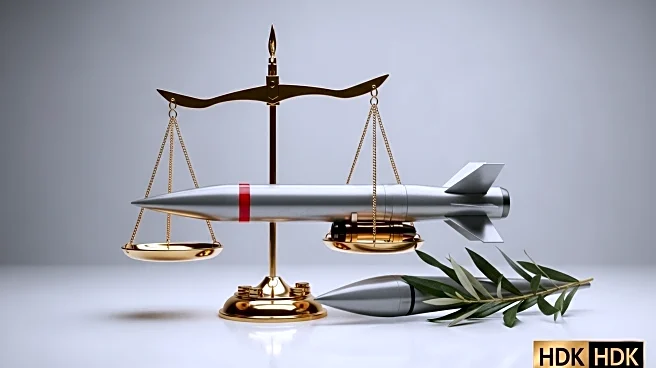What's Happening?
President Trump announced on Saturday that he would impose new sanctions on Russia only if all NATO member nations agree to do the same. This announcement comes amid heightened tensions following Russia's increased aggression against Ukraine. Despite a recent summit between President Trump and Russian President Vladimir V. Putin in Alaska, no progress has been made towards ending the conflict. President Trump has stipulated that NATO countries must also cease purchasing Russian oil and impose steep tariffs on China as part of the conditions for sanctions. The situation has escalated with Russian drones being shot down by Polish and NATO forces after entering Poland's airspace, raising concerns among European leaders. President Trump has criticized NATO for not taking sufficient action against Russia, and the Pentagon has announced plans to end a program that trains and assists NATO forces in the Baltics.
Why It's Important?
The conditions set by President Trump for imposing sanctions on Russia could significantly impact international relations and the geopolitical landscape. If NATO countries comply, it could lead to a unified stance against Russian aggression, potentially curbing its actions in Ukraine. However, the requirement to stop buying Russian oil could strain economic relations and energy supplies in Europe, which heavily relies on Russian energy exports. The call for tariffs on China adds another layer of complexity, potentially affecting global trade dynamics. The situation poses challenges for NATO's cohesion and effectiveness in addressing security threats, with implications for U.S. foreign policy and its role in international alliances.
What's Next?
The next steps will depend on the response from NATO member nations to President Trump's conditions. If NATO agrees to the sanctions and oil embargo, it could lead to increased diplomatic pressure on Russia. However, if NATO countries are unable or unwilling to meet these conditions, it may result in a lack of coordinated action, potentially emboldening Russia. The situation also raises questions about the future of U.S. involvement in NATO and its commitment to collective defense. European leaders may need to reassess their energy strategies and diplomatic approaches to address the evolving security landscape.
Beyond the Headlines
The broader implications of President Trump's conditions for sanctions on Russia include potential shifts in global energy markets and trade relations. The emphasis on stopping oil purchases from Russia could accelerate efforts to diversify energy sources and invest in renewable energy. Additionally, the call for tariffs on China may influence global supply chains and economic policies. The situation highlights the complexities of balancing national security interests with economic dependencies, and the role of international alliances in addressing global challenges.












